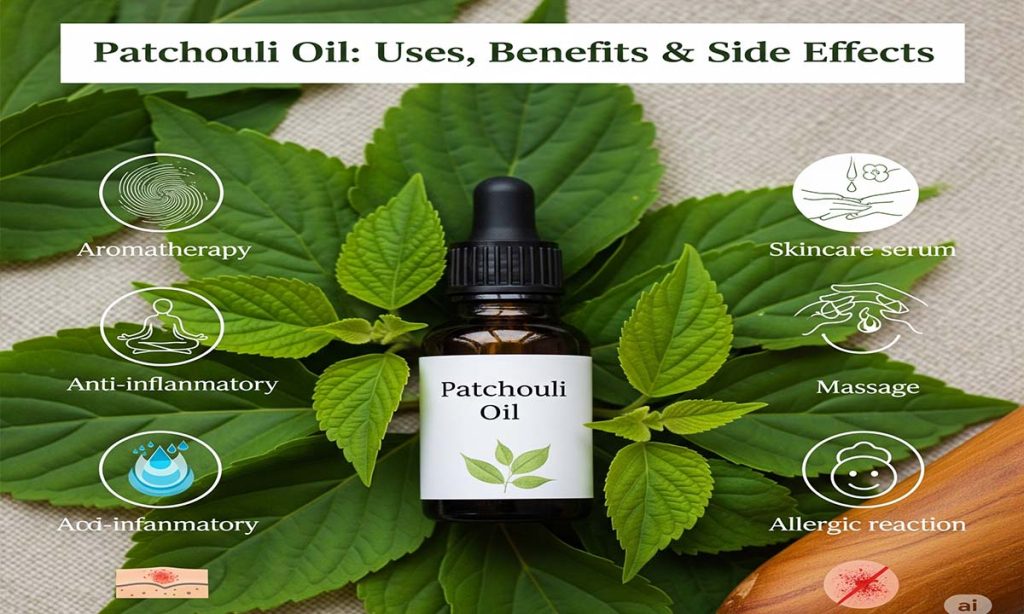Patchouli oil is an aromatic essential oil derived from the dried leaves of the patchouli plant (Pogostemon cablin). It has a rich, earthy-spicy scent that’s become synonymous with herbal fragrances. Widely used in aromatherapy, perfumery, and natural skincare, This is celebrated for its soothing properties and grounding aroma. This article explores what patchouli oil is, its traditional and modern uses, potential health benefits, and safety considerations.
It has a long history in traditional medicine and perfumery. It was used in Asia for ailments like colds, fevers and headaches. Today it’s prized in products like soaps, perfumes, and deodorants. The FDA even approves patchouli oil as a food flavoring. In aromatherapy, its earthy aroma is believed to reduce stress, uplift mood, and even enhance libido.

Table of Contents
What Is Patchouli Oil?
It is extracted from the leaves of Pogostemon cablin, a bushy perennial shrub in the mint family. The leaves are typically shade-dried and steam-distilled to produce a rich, amber-colored essential oil. Native to tropical Asia (especially Indonesia, Malaysia, India, and China), the patchouli plant can grow up to about 1 meter tall and is known for its large, fragrant leaves. When the leaves are bruised or aged, they emit the characteristic earthy, woody, and slightly spicy aroma that defines patchouli oil.
History and Traditional Uses
In traditional Asian medicine, It was used to treat colds, fever, vomiting, and stomachaches. Its leaves were also used to scent clothing and keep insects away – in fact, pacholi (the plant’s Hindi name) means “to scent”. Historically, patchouli oil was applied to textiles (like Indian silk shawls) to ward off moths. Today, Indonesia produces about 90% of the world’s its harvest, making it a major global source of this fragrant oil.
Chemical Composition
Patchouli essential oil contains over 140 chemical constituents. The primary compounds are sesquiterpenes and sesquiterpenols, including patchoulol (patchouli alcohol), pogostone, and α-bulnesene, among others. It also contains flavonoids, organic acids, and other terpenes that contribute to its rich fragrance and potential bioactivity. Scientific reviews report that these components exhibit anti-inflammatory, antimicrobial, antioxidant, and even anticancer effects in laboratory studies. These properties help explain many of patchouli oil’s traditional uses for skin and healing.
Benefits of Patchouli Oil
Patchouli oil is valued for its versatile health and wellness benefits. Key benefits include:
- Skin care: The oil’s anti-inflammatory and antiseptic compounds can soothe irritated skin and support healing. It is often used to calm acne or eczema by reducing redness and balancing skin flora. Its astringent action may also help tighten pores and tone the skin.
- Aromatherapy & Mood: Patchouli’s deep, earthy aroma is grounding and calming. Inhaling patchouli oil may help lower stress and anxiety. Studies suggest it can even reduce cortisol (the stress hormone) and promote a sense of well-being. Many people use patchouli aromatherapy oil during meditation or massage to create a soothing environment.
- Antimicrobial: Research shows its has antibacterial and antifungal activity. Its natural antiseptic qualities have been traditionally used to cleanse wounds and prevent infection. These properties also make it useful in deodorants and foot powders.
- Insect repellent: A study found that applying patchouli oil to the skin can repel mosquitoes for about two hours, making it a natural alternative to chemical insect repellents. Patchouli’s strong scent can also deter other insects and pests.
- Other traditional uses: Patchouli has been regarded as an aphrodisiac and mood lifter. It’s also been used in folklore to help reduce insomnia and improve appetite, although scientific evidence for these effects is limited.
Uses of Patchouli Oil
Patchouli oil is prized for its versatility in aromatherapy, cosmetics, and home uses. It is a common ingredient in products such as perfumes, soaps, and incense, where its musky scent and potential therapeutic effects can be enjoyed. Some of the key uses include:
- Aromatherapy: Diffuse patchouli aromatherapy oil or add a few drops to a diffuser. Its grounding, earthy scent can help reduce stress and create a calm atmosphere. It’s also added to massage oils and bath blends for relaxation.
- Perfumes & Incense: Patchouli is a classic base note in many perfumes and colognes. Patchouli oil incense sticks or cones are popular in meditation and yoga because the long-lasting, spicy-earthy aroma promotes focus and tranquility.
- Skincare & Soaps: It is often added to soaps, shampoos, lotions, and body oils for fragrance and skin-soothing benefits. For example, artisanal patchouli soap is a popular handcrafted product.
- Food Flavoring: Patchouli oil is FDA-approved as a flavoring agent. It’s used in small quantities to flavor desserts, candies, gelatin, and beverages. Its unique aroma can add depth to sweet or herbal dishes.
- Household Uses: Beyond personal care, patchouli oil’s strong scent repels insects, so it’s used in natural bug-repellent sprays and potpourri. Its antibacterial properties also make it useful in homemade cleaning solutions and disinfectant mists.
How to Use Patchouli Oil
Patchouli oil can be used in various ways. Follow safe usage tips:
- Aromatherapy Diffusion: Add 3–5 drops of to a diffuser or vaporizer. The warm mist carries its aroma through the air, helping to reduce tension. For a quick inhale, add a few drops to a bowl of hot water, lean over it with a towel, and breathe in the steam.
- Topical Application: Always dilute in a carrier oil (like jojoba, coconut, or sweet almond) before applying to skin. A typical dilution is 1–2% (about 1–2 drops of patchouli per teaspoon of carrier oil). Use this blend as a massage oil or apply to pulse points for fragrance. Always do a patch test to check for skin sensitivity.
- Bath or Body Oil: Add 4–6 drops of patchouli oil to a warm bath (mix first with a tablespoon of carrier oil or bath milk) to soothe the skin and inhale its aroma. You can also blend patchouli with a carrier oil and use it as an all-over body oil after showering.
- DIY Perfume/Spray: Make a homemade patchouli perfume by mixing patchouli essential oil with a carrier oil or alcohol in a spray bottle. Use sparingly on pulse points (wrists, neck) as needed for a long-lasting musky fragrance.
- Soaps & Candles: When making soaps, lotions, or candles at home, add a few drops of patchouli for its fragrance. Note that patchouli-scented products often become richer-smelling with age as the oil “matures.”
Side Effects and Precautions
Patchouli oil is generally considered safe when used properly, but follow these precautions:
- Skin irritation: Undiluted patchouli oil can cause redness or a rash on sensitive skin. Always dilute and perform a patch test.
- Blood clotting: Patchouli oil may thin the blood. People taking anticoagulant medications or with bleeding disorders should avoid it.
- Pregnancy/Breastfeeding: Limited safety data exists, so it’s best to avoid patchouli during pregnancy, nursing, or on young children.
- Ingestion: Do not swallow patchouli . It can be toxic if ingested. As with all essential oils, oral intake is not recommended without expert guidance.
- Strong odor: Some individuals may find patchouli’s strong scent overwhelming. In rare cases, it can trigger headaches, dizziness, or nausea if overused in the air.
Use patchouli oil responsibly, and consult a healthcare provider if you have concerns about interactions or conditions.
FAQs
Q: What is patchouli oil?
A: Patchouli is an essential oil extracted from the leaves of the patchouli plant (Pogostemon cablin). It has a strong earthy-spicy aroma and is widely used in perfumes, soaps, and aromatherapy blends.
Q: What is patchouli oil good for?
A: Patchouli oil is commonly used for skin care and relaxation. It may help soothe skin irritation and inflammation, relieve stress and anxiety when inhaled, and acts as a natural insect repellent. It also adds a deep fragrance to soaps, perfumes, and incense. Many of its traditional uses (like promoting relaxation or healing skin) come from its antimicrobial and anti-inflammatory properties.
Q: What does patchouli oil smell like?
A: Patchouli oil has an intense, earthy, woody, and sweet scent. It is often described as musky and slightly spicy. Its powerful fragrance makes it an excellent base note in many perfumes and aromatherapy blends.
Q: How do I use patchouli oil?
A: There are many ways to use patchouli essential. You can diffuse 3–5 drops in a vaporizer to fill a room with its calming scent. For skin use, always dilute it: mix 1–2 drops of patchouli oil with a teaspoon of carrier oil (like coconut or jojoba). This diluted blend can be applied to the skin, added to bath water, or used as a fragrant massage oil. You can also make a DIY patchouli essential oil perfume spray by mixing it with water or alcohol in a spray bottle.
Q: Are there side effects of patchouli oil?
A: Patchouli is generally safe when diluted, but pure oil can irritate the skin. Never ingest patchouli oil; it can be toxic if swallowed. Avoid use if you have blood clotting issues, are on blood-thinners, or are pregnant/breastfeeding. In high doses, its strong scent might cause headaches or nausea for sensitive individuals.
Conclusion
Patchouli oil is a powerful, fragrant essential oil with a rich tradition in aromatherapy, perfumery, and herbal medicine. Its earthy scent is not only pleasing but is associated with stress relief, skin benefits, and antimicrobial properties. When used properly (diluted and safely), patchouli oil can be a natural ally for skincare and relaxation. If you’re interested in natural wellness, try incorporating patchouli oil into your routine—whether in a diffuser, soap, or massage blend—and see how it works for you.
Have you tried patchouli ? Leave a comment below and share your experience. If you found this guide helpful, consider sharing it on social media to help others discover the benefits and uses of patchouli
Sources: Information compiled from WebMD, scientific reviews, and aromatherapy experts.




